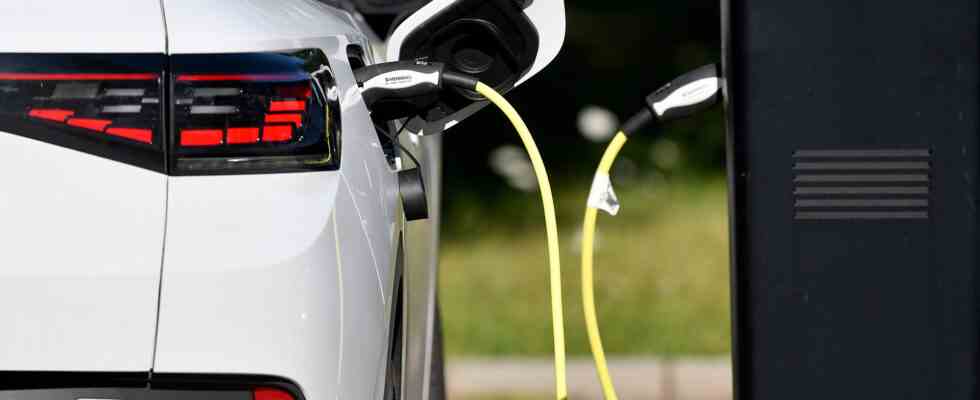Status: 03/24/2023 1:00 p.m
Electric cars have recently experienced a boom. But if you want to cover many kilometers with them, you have to dig deep into your pocket. Are the manufacturers pursuing a wrong model policy?
The mayor of Dormagen, Erik Lierenfeld (SPD), has recently been driving a Mercedes EQS 450+. The purchase price for the electric car is almost 130,000 euros. Many citizens are appalled. “It had to be a vehicle with a range of around 500 kilometers,” Lierenfeld explains WDR. Cars with long ranges are hardly available in smaller and cheaper versions. Is that correct?
At 783 kilometers, the Mercedes is one of the vehicles with the longest range on the electric car market. But other models – such as BMW, Hyundai, Tesla and Ford – promise a range of more than 600 kilometers. The problem: They are all relatively expensive. Buyers have to pay between 49,000 and 143,000 euros for the seven electric cars with the greatest range.
Range of e-cars: the larger/more expensive, the farther?
Maria Kümpel, WDR, Plusminus 9:45 p.m., March 22, 2023
44 percent of registered e-cars are SUVs
There is criticism of the manufacturer’s model policy. “It’s a big mistake if the automotive industry doesn’t offer affordable, resource-efficient and climate-friendly cars,” says Winfried Hermann, Green Minister of Transport in Baden-Württemberg ARD magazine plus minus. More affordable e-cars are needed, otherwise the industry will prevent the switch to climate neutrality.
The fact that many electric cars are so expensive in Germany is also due to the demand behavior of the Germans. In 2022, more small e-cars were registered than mid-size cars. But the share of electric SUVs was the largest. This is the result of figures from the Federal Motor Transport Authority (KBA). According to a study by the Center of Automotive Management (CAM), 44 percent of all newly registered e-cars last year were SUVs.
Car manufacturers are strengthening the luxury segment
This is partly due to the product range. “We see a clear tendency for automobile manufacturers to focus more on larger vehicles, on special fashion segments such as SUVs, which are expensive,” says Stefan Bratzel, Director of CAM. Because the margin is particularly high there.
From the manufacturer’s point of view, this strategy pays off. For example, Mercedes-Benz earned around 14.8 billion euros last year – around a third more than in the previous year. “We wanted to strengthen the luxury business. We had significant growth in the top models,” says Ola Källenius, CEO at Mercedes.
HP strength as a climate impact
If you want to have a lot of range, you also have to put up with a lot of horsepower. The six electric cars with the longest range on the market have between 231 and 544 hp. Only one model from Hyundai is below that with 151 hp and a range of over 600 kilometers.
The high-horsepower cars are not only expensive, but also harmful to the climate, claims Baden-Württemberg’s Transport Minister Hermann: “The challenge is therefore to produce simpler and climate-neutral cars.” Not every car has to be able to drive 200 kilometers per hour.
Heavy cars use more electricity
And: Electric SUVs are not really ecologically efficient. “The heavier the car, the greater the power consumption,” says Sven Bauer, head of the German battery manufacturer BMZ. Ideally, you take a small car and a battery that you can safely drive 500 kilometers with. “But Germans don’t like small cars at all. They always want bigger and bigger,” says Bauer.
The range of electric cars is influenced by several factors. Speed, driving style and temperature have a major impact. The size and weight of the car also affect the range. In reality, the ranges often deviate from those specified by the manufacturer. The official range information is of little value, also confirms the ADAC.
Around a third more electrical approvals
Despite the skepticism that still exists among the population, there was an electric boom last year. Almost 470,000 electric cars were newly registered. That’s more than ever before – an increase of more than 30 percent compared to 2021.
Meanwhile, Berlin and Brussels are fighting over the question of whether cars with a combustion engine will be allowed to be newly registered in the EU after 2035. A lot will change in the electric car market by then. Maybe then there will also be cheaper cars that can achieve long ranges.
The first reported on this topic in “Plusminus” on March 22, 2023 at 9:45 p.m.

